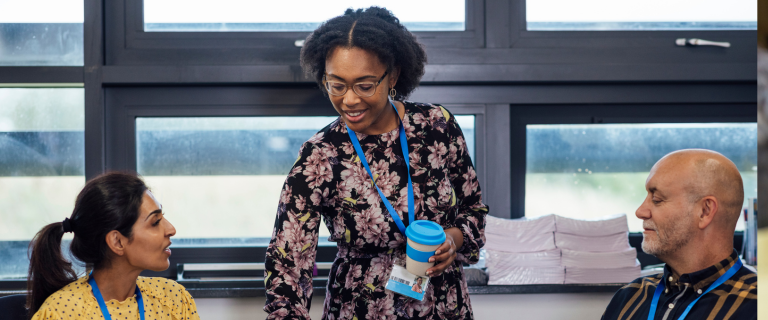Connecting the dots: making SEND training work for everyone

Author Maria Buttuller
Date 9th Jan 2025
0 comments
"What changed everything for us wasn't bringing in more training - it was creating spaces for staff to share what they already knew," reflected a Year 6 teacher. "There's so much expertise in our school corridors; we just needed to connect the dots."
Have you ever wondered why, despite the incredible commitment of school staff to supporting pupils with SEND, we sometimes struggle to achieve the consistency we're striving for?
The dedication of school staff in supporting pupils with SEND shines through in countless ways - from teachers skillfully adapting lessons in the moment, to teaching assistants who instinctively know when a child needs a quiet moment. Yet as research shows, our education system faces growing challenges. With over 1.57 million children (16% of pupils) identified with SEN, and increasingly complex needs, even our most dedicated staff members can feel overwhelmed by the responsibility of getting it right for every child.¹
The Real Impact
Working alongside schools across the country, I'm continually inspired by the wealth of expertise and intuitive understanding that already exists. Recently, a teaching assistant shared her innovative strategies for supporting a child with sensory needs - approaches that could benefit many other children if there were more opportunities to share this knowledge across the school community.
The challenge isn't about creating caring environments - our schools already prioritise this. Instead, it's about finding ways to harness and share the excellent practice that already exists, while ensuring all staff have access to the latest understanding and approaches.
As research shows, young people value the care and empathy they receive from school staff - they simply want to ensure this understanding is consistent across their whole school experience.² The increasing complexity of need (as evidenced by the 115% rise in EHCPs since 2015) means that even the most experienced and dedicated staff members can benefit from additional support and understanding.³
Building Sustainable Solutions
The path forward isn't about wholesale changes - it's about creating systematic approaches that build on existing expertise. In my conversations with schools implementing effective changes, several key themes emerge:
1. Developing a Whole-School Approach
Last week, I spoke with a headteacher who transformed her school's SEND provision by focusing first on bringing people together. "It wasn't about bringing in expensive external training," she explained. "It was about creating spaces for our staff to share what they already knew." This approach led to:
- Protected time for collaborative planning between teachers and support staff
- Regular, bite-sized training sessions that fit naturally into the school day
- Opportunities to observe and share good practice across year groups
- Clear systems for communicating about pupil needs and successful strategies
2. Making Training Accessible
A SENCo I work with recently shared how she revolutionised her school's approach to SEND training. "We stopped thinking about training as big, one-off events," she said. "Instead, we made it part of our daily conversation." Their approach includes:
- Breaking training into manageable chunks that staff can digest easily
- Providing resources that can be accessed when needed, rather than all at once
- Ensuring training directly relates to daily classroom experiences
- Building in time to practise and reflect on new approaches
3. Creating Clear Communication Channels
One primary school's journey particularly stands out. Their deputy head noticed that while excellent practice existed throughout the school, it often stayed isolated within individual classrooms. They focussed on:
- Establishing clear pathways for raising concerns about pupils
- Creating simple but effective ways to document and share successful strategies
- Setting up regular opportunities for staff to update their knowledge
- Implementing systems for tracking progress and measuring impact

Practical Next Steps
For school leaders looking to strengthen their approach, the journey often begins with small but significant steps:
1. Start With What Works
A secondary school I recently supported began their journey by simply asking their staff what was already working well. This appreciation of existing expertise led them to:
- Identify and celebrate existing expertise in their school
- Build systematically on current strengths in SEND provision
- Listen carefully to where staff felt they needed additional support
2. Create Time and Space
Finding time in an already packed school day isn't easy, but one middle school found creative solutions by:
- Building regular development opportunities into existing meetings
- Protecting small but consistent slots for collaboration
- Establishing clear, efficient communication systems that didn't add to workload
3. Think Long-Term
Success comes from sustainable change, as one school leader pointed out: "We stopped looking for quick fixes and started thinking about where we wanted to be in three years." This meant:
- Focusing on sustainable, systematic changes rather than quick fixes
- Prioritising consistency across the school
- Ensuring resources and support were readily accessible to all staff
Moving Forward
Remember, this isn't about adding to workload - it's about finding smarter ways to work together, share knowledge, and support each other in the vital work of supporting all our pupils. The most effective changes often start small but build consistently over time.
By focusing on sustainable, collaborative approaches to SEND training, we can better support our dedicated staff in delivering the best possible outcomes for every child in their care. After all, as one teacher recently told me, "When we get it right for our most vulnerable pupils, we get it right for everyone."
What approaches have you found successful in sharing SEND expertise across your school? We'd love to hear your experiences in the comments below.
Get in Touch
To explore how OLT can help support your school and strengthen your whole-school approach to SEND:
- Book a call with our team
- Enquire about our SEND training packages for Schools, MAT's and LA's.
References:
¹ SEND and AP Improvement Plan Data, Department for Education (2024)
² "SEN and Disabilities: strategies for improving pupil outcomes and experience. OLT webinar. Andre Imich (2024)
³ Education Policy Institute SEND Data Analysis (2024)
⁴ Education Endowment Foundation, 'Special Educational Needs in Mainstream Schools' (2024)
Tags


There are no posts for this topic yet